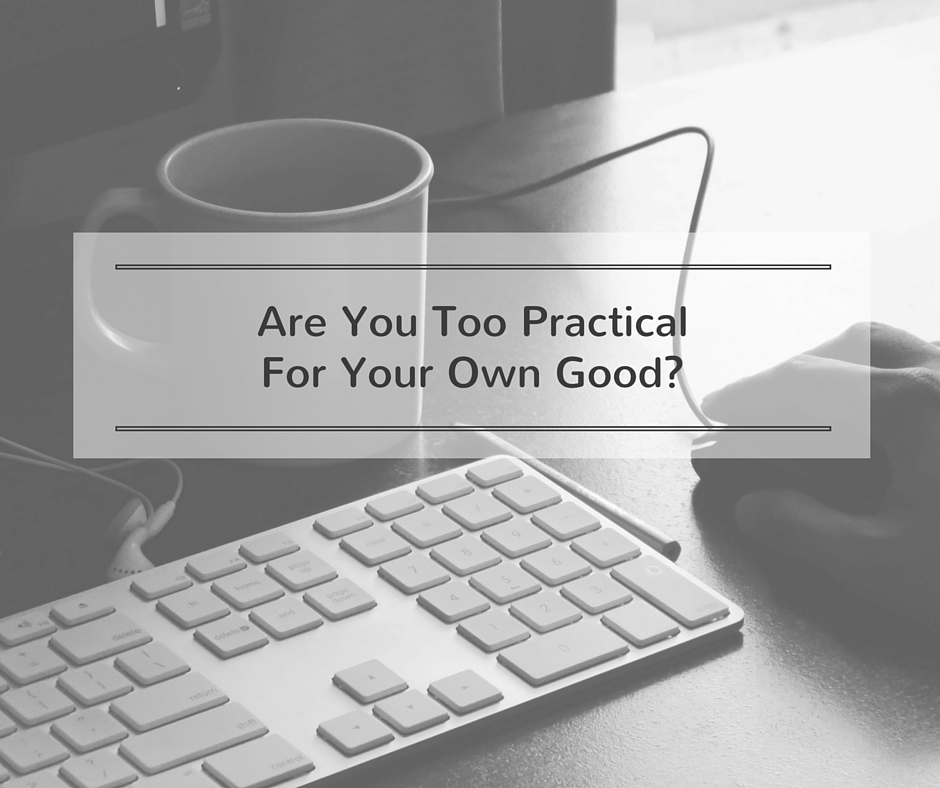
I’m a recovering practical. It’s only recently that I’ve admitted this as a weakness.
I realized practicality has been a crutch since I was first faced with uncertainty on what I wanted to do with my life. It started at age 16, when I decided to attend an accelerated program towards an engineering degree simply because my dad was an engineer.
That was an acceptable starter decision. Yet the series that followed were increasingly worse offenders—a mixture of elimination, circumstance, convenience and the deepening poison of practicality.
When engineering and I didn’t jive, I decided to get a business degree for its overarching applicability in life. I ended up in corporate finance for my next internship, and was given a full-time offer.
I decided to take the offer—partially out of convenience, partially since I didn’t know what else to do, and partially because finance jobs pay more right out of college.
This decision resulted in several years of mildly tolerable yet soul-crushing misery that is most entry level corporate jobs. I spent those several years never feeling like I was doing anything of significance. I was living a mediocre life with unfulfilled aspirations, doing unsatisfying work for a paycheck, and feeling uninspired and depleted of energy.
I began to think this was just how life was supposed to be.
I wasn’t always like this. I came from very idealistic beginnings as a child, when most of us are more in tune with our true selves. I originally dreamed of being a sole ballerina on stage. As an tween, I was fascinated with sharing my deepest thoughts in multiple journals each year. It is remarkable how much insight can be gleaned from childhood.
Here are the 7 perils of being too practical for your own good:
1) You think life is supposed to be hard
Work is supposed to suck. I’m lucky to even have a job. Some dreams are meant to be dreams.
These phrases are self-talk that aren’t true—from the years of conditioning you’ve received since childhood from well-meaning parents, teachers, peers, and media sources. The big companies are constantly churning out marketing to make you feel inadequate unless you have the latest branded clothing, car or gadget. So you go out and buy the latest items on your credit card, which you then have to pay off—and the cycle repeats over and over.
The belief that life is meant to be hard is the number one peril of practicality. Whatever you believe becomes reality.
2) You aren’t enjoying life as much as you could be
When you’re too busy taking care of the endless to-do items and tasks, you barely have time to have fun. When stressing out, dreading work the next day, or doing monotonous work that you dislike, your body takes a toll.
Taking time to enjoy life contributes to your health. It allows your body to rest, relax and heal. The mind and the body are far more connected than we care to notice until we start seeing the long-term impact.
3) You don’t give your intuition much time of day
It’s likely that if you’re too practical, you’re not listening to your intuition—the inner voice that wants to learn, create and have fun.
And you’re due for a future later-life crisis with a shiny sports car purchase and big life transition. Listen to that inner voice. It’s much wiser than your conditioned self on things that are truly important to you.
4) You don’t learn or experiment as much
You never know what one thing will lead to next. Crypto-currency, philosophy, and photography may have nothing to do with each other at surface level, but you may be surprised at the parallels you can draw from very dissimilar concepts.
The funny thing about breakthroughs is they are often insights gained from making connections between seemingly unconnected things.
5) You miss out on opportunities
When you’re too practical, you prioritize the urgent items with short-term results or gains. You don’t do things simply out of enjoyment, to learn or just to see what happens.
The biggest and most worthwhile accomplishments aren’t usually foreseeable at the beginning. They are often the result of long-term work and an element of serendipity.
6) You end up not fully realizing your true interests
When you spend your time on what others want you to do, you don’t stand for anything that is truly yours. By not being motivated to delve in further and become a thought leader, you’re not going to contribute something different than what others are doing.
Even if you don’t know what you might be interested in, the best way to find out is to try. Very few people know their “calling” in life without any exploration. It’s a process, it’s self-discovery, and it’s often not easy. In order to get there, you need to explore, then have the courage to choose something and stick with it long enough to see if it works.
7) You’re not as likely to contribute and make an impact on others
When you’re not interested in what you spend most of your time doing, you won’t spend more time on it than you need to. You’re also not feeling fulfilled, joyful, or the irresistible urge to share what you’re working on. Amazing things start happening when you start going after what you’re passionate about.
In deciding what to do with your life, embrace the uncertainty that comes along with what you most desire. Don’t choose the practical option out of fear. Don’t be too practical for your own good. Beware of the perils of practicality and go after those dreams.